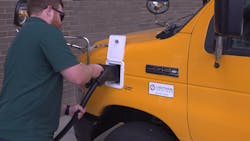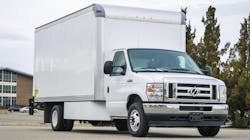Lightning eMotors looks to expand further into truck market
Lightning eMotors has delivered more than 600 zero-emission commercial vehicles to customers, who have driven those vehicles a cumulative 5 million miles, and the electric vehicle company is preparing to expand into the freight truck market as government incentives and mandates drive EV demand, but supply chain snags and labor concerns remain obstacles.
Approximately half of those vehicles are hauling freight, Nicholas Bettis, the company’s VP of marketing and sales operations, told FleetOwner. According to Lightning's second-quarter earnings summary, the company is seeing solid demand for school buses and shuttles, but CEO and Co-founder Tim Reeser expects trucks and the freight market to play an increasingly important role in its plans.
ZEV incentives and mandates—carrots and sticks
As Reeser explains, electric-vehicle makers have been busy preparing for both incentives and mandates from federal and Californian governments—what he calls the carrot-and-stick approach—that the company expects will cause EV demand to explode.
“For the last year, we’ve seen a lot of focus on shuttles and school buses. I think trucks, given the California mandate, will come back,” Reeser told FleetOwner, adding that much of the growth Lightning expects in the near future resides in the Class 4 and transit bus spaces in California.
California requires half of all new heavy-duty vehicles sold in the state to be electric by 2035, and under its Advanced Clean Trucks and Advanced Clean Fleets rules, it mandates a 100% switch to ZEVs by 2045.
“It’s important to keep in mind there’s over 30,000 of these kinds of trucks bought every year in California,” Reeser said, “so it's a very significant market when you look at just Class 4 trucks alone.”
See also: Road to humanless trucking hits a California-sized political pothole
Additionally, California businesses can utilize price breaks from the Hybrid and Zero-Emission Truck and Bus Voucher Incentive Project (HVIP) in combination with the IRA.
See also: California, engine manufacturers enter Clean Truck Partnership to meet emissions goals
“These incentives, frankly, have kind of made it even more difficult to predict,” Reeser said. “The incentives sometimes take a long time to actually turn into purchase orders and for customers to analyze it and understand what they're going to do, whereas mandates are going to be far more consistent." He added: "You see these mandates coming out. It means we can more productively or more predictably manage our demand. There's a lot of suppliers that if we have predictable demand, and then we can pass that predictable demand on to the suppliers, they can make the investments for scale, and ensure all of us survive and succeed."
Chassis, battery supply chains slow scaling
“The supply chain has been and continues to be a bit immature, so that meant we’ve had to buy a lot of inventory to be able to deal with all the gyrations of the supply chain.”
This is despite supply chain issues encountered by General Motors and Ford, which respectively provide Lightning’s Class 3 and 4 chassis. The companies for the past two years were under-allocating chassis for its buyers.
“And then all of a sudden, frankly, this year, they gave us all too much.”
The oversupply of chassis is largely in anticipation of a possible strike from the United Auto Workers union, which could occur as soon as Sept. 15. Reeser said he thinks a strike is likely.
The company also is developing its Lightning eChassis, so it can offer both the electrification of existing OEM chassis and purpose-built Class 4 and 5 EVs.
GM, Ford, and Hyundai are among companies that have had major EV-battery recalls.
“Nobody’s been immune to the fact that batteries are hard, and all those are very capable companies,” Reeser said. “I think everybody's discovered whether you're a big OEM or a small OEM that batteries are harder than everybody thought."
Two of Lightning’s battery providers have gone belly-up: Proterra filed for bankruptcy last month, and Nikola is in the process of liquidating Romeo Power, a manufacturer it acquired last year. Because Lightning multisources, it has continued to receive batteries from CATL.
See also: Nikola to recall 209 trucks after battery fire
The Inflation Reduction Act provided billions of dollars of incentives for companies to build U.S. manufacturing plants, which Reeser hopes will alleviate supply concerns while allowing EV makers to scale up.
“The supply chain becomes even more challenging in the early stages because you can't wave around, ‘Hey, I got 10 million vehicles to play with here.’ You're waving around 10,000 vehicles or 1,000 vehicles; consequently, the supply chain takes longer to make the investments to scale up. And in many cases, batteries were harder to scale than people thought.”
Reeser still wants the public to know that Lightning has invested in its manufacturing to the point where it is ready to grow.
"People have said, 'Well, California is going to push off this regulation.' In California saying, 'No, we think the manufacturers are ready,'" Reeser said that, "They're right. We're ready. We're ready to scale."
About the Author
Scott Keith
Scott Keith is a former fleet owner digital editor, who was on staff from 2022 to 2023.



